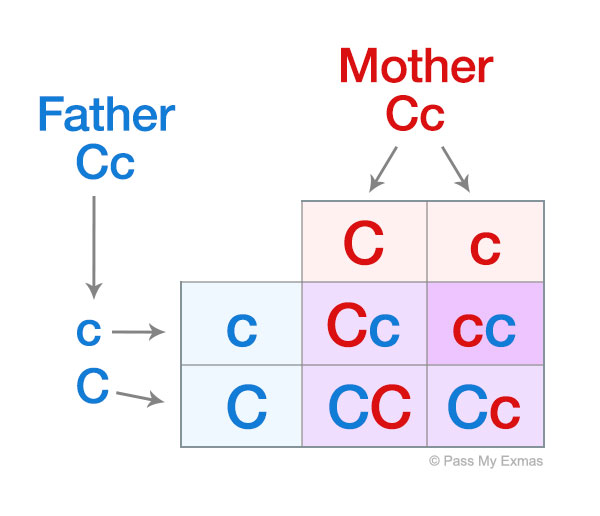Inherited diseases
Most inherited diseases are caused by recessive alleles. These are the mutant forms of normal alleles found in healthy people. A mutation is a change in the DNA base sequence, changing or preventing the production of the protein, which the gene normally codes for. Diseases caused by mutations are often referred to as inherited diseases. They are different from infectious diseases which are caused by microbes.
Cystic Fibrosis
Cystic Fibrosis, or CF, is the most common inherited disease of northern Europeans and white North Americans. It affects about 1 person in 2000. It gets its name from a fibrous cyst that appears in the pancreas. It is caused by a recessive mutation in a gene located on chromosome 7. The gene codes for a particular protein which allows for the diffusion of chloride ions in and out of the epithelial cells (the cells that line the cavities of the body). One of the normal functions of the epithelial cells is to form mucous glands which secrete mucus. In Cystic Fibrosis sufferers this protein does not function and as a result the epithelial cells produce thick, sticky mucus. The parts of the body most affected are the lungs, pancreas and liver. The thick mucus blocks up the air passages of the lungs and the branches of the pancreatic duct and the bile duct from the liver to the gut. The mucus makes good breeding ground for germs so sufferers repeatedly get lung infections and digestive problems.
Cystic Fibrosis treatment involves chest physiotherapy (up to 5 times a day) including slapping the back of the patient to remove mucus of the lungs. Strong antibiotics are also given to fight infections and enzyme supplements to improve food digestion. Treatment using the enzyme human DNase in the form of an aerosol to break down the DNA of dead infection bacteria (a component of the thick mucus) has some reported success. Gene therapy is another form of treatment whereby the faulty genes are replaced with normal genes. Scientists are currently working in the development of this treatment.
Cystic Fibrosis is caused by a recessive allele, thus to have the disease a person must be homozygous and carry two copies of the recessive allele. If we denote the recessive allele by “c” and the dominant allele by “C”, then a heterozygous person “Cc” does not have the disease but acts as a carrier who can pass it on to their children.
For example, if a father and mother are carriers then the table below shows there is a 1 in 4 chance of their child having Cystic Fibrosis.

Summary of Cystic Fibrosis
The table below gives a summary of Cystic Fibrosis:
Cause
Cystic Fibrosis is caused by a recessive mutation in a gene located on chromosome 7. The gene codes for a particular protein which allows for the diffusion of chloride ions in and out of the epithelial cells (the cells that line the cavities of the body). One of the normal functions of the epithelial cells is to form mucous glands which secrete mucus. In Cystic Fibrosis sufferers this protein does not function.
Symptoms
The epithelial cells produce thick, sticky mucus. The parts of the body most affected are the lungs, pancreas and liver. The thick mucus blocks up the air passages of the lungs and the branches of the pancreatic duct and the bile duct from the liver to the gut. The mucus makes good breeding ground for germs so sufferers repeatedly get lung infections and digestive problems.
Treatment
- Chest physiotherapy (up to 5 times a day) including slapping the back of the patient to remove mucus of the lungs.
- Strong antibiotics to fight infections.
- Enzyme supplements to improve food digestion. The enzyme human DNase in the form of an aerosol to break down the DNA of dead infection bacteria.
- Gene therapy.
